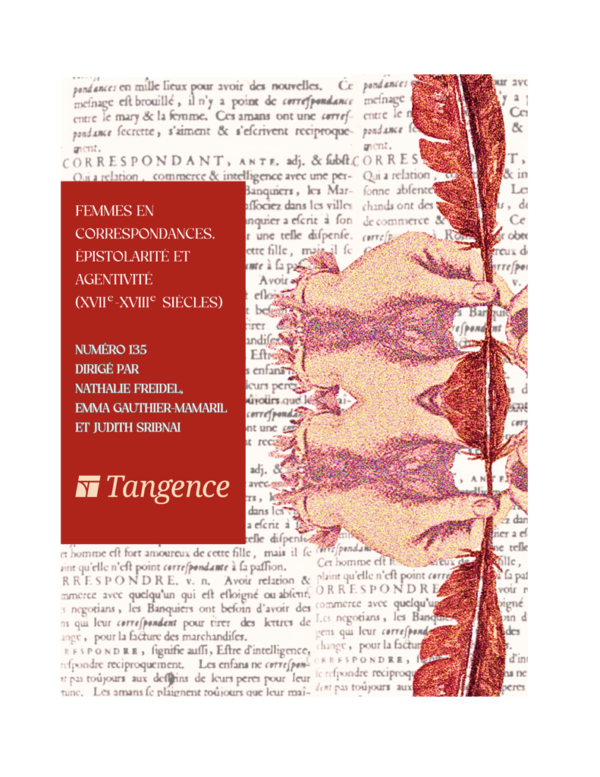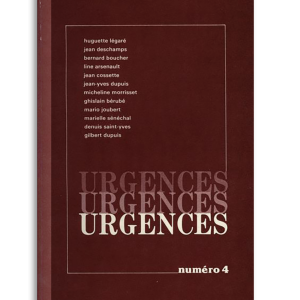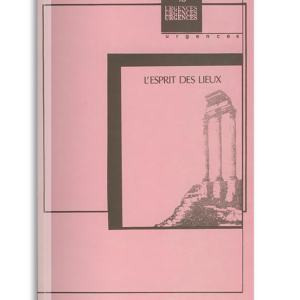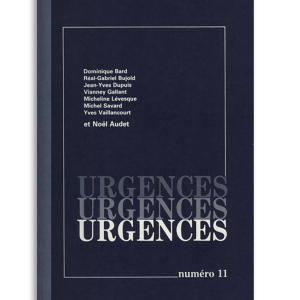“She was a girl of great distinction, intelligence and virtue.” Single women in seventeenth-century epistolary networks
Juliette Eyméoud
This article proposes to shed light on the history of filles majeures (single women over 25 years of age) and reintegrate some of them into the intellectual and literary history of the seventeenth century. It focuses on the trajectories of two ladies, Catherine-Françoise de Bretagne (1617-1682) and Henriette de Conflans (1632-1712), whose epistolary activity testifies to both their subordinate social condition and genuine writing talent. The letters capture the voices of two single women and provide details about their daily life, their entourage, their way of thinking. They are also sources for studying their commitments and involvement in prestigious epistolary networks. Hence, a question arises : can a relationship be found between these women’s single status and their writing ?
From writing in networks to writings about the self : the correspondences of Catherine d’Aspremont, Anne-Marie-Louise d’Orléans and Françoise de Motteville (May-June 1660)
Fanny Boutinet
This article examines the letters written by Françoise de Motteville, Anne-Marie-Louise d’Orléans and Catherine d’Aspremont in spring 1660. The writers attended the marriage of Louis XIV and addressed several letters to a network of correspondents eager for the latest news of the court. The study of this correspondence sheds light on a network of aristocratic women, its publishing practices and the actions undertaken by its members via letters. The present article also discusses the correspondence between two memorialists, Françoise de Motteville and Anne-Marie-Louise d’Orléans, who employed high society’s codes of creative writing. We analyze the relationships they maintain between epistolary writing and memorialist writing, with letters commented or reprised in the memoirs. Our study thus reports on the exchange, circulation, conservation and reuse of letters by women authors in the seventeenth century. A collegial practice, a writing of immediacy, letters ultimately participate in the construction of a personal narrative, with epistolary writing eventually becoming the memoir.
Marie de l’Incarnation or curtailed freedom
Marie-Christine Pioffet
This study discusses how the letters of Marie de l’Incarnation express the very idea of freedom, a notion that evolves along with her contact with Indigenous women and her rebellious lay companion Madame de la Peltrie. In both her correspondence and spiritual writings, the Ursuline sister remains an eminently paradoxical figure, torn between her vows of obedience and poverty, her wish to defend her community against the tyrannical power of the ecclesiastical authorities and her longing for emancipation. Letters, a personal, private conversation, become the privileged medium of a feminine agency that allows the writer to cast off the clerical yoke and take her place in colonial history.
The power of weakness. The mystical ethos of Jeanne Guyon in light of her correspondence
Bastian Felter Vaucanson
This article examines the epistolary writing of the mystic Jeanne Guyon (1648-1717) based on the discourse theory of Dominique Maingueneau, notably the notions of “embodied ethos” and “scene of enunciation”. Recalling the work of Michel de Certeau on mystical discourse, the article registers Maingueneau within the theological referentiality of the seventeenth century, developing an analysis that highlights the paradoxical performativity of Madame Guyon’s self-presentation. Our study maintains that Madame Guyon presents herself as a guarantor of the mystical ethos while activating the Christian topos of weakness—but a weakness which, in the Paulinian sense (1 co. 1 25-27), is, in reality, a power to act. Openly admitting that the spiritual effectiveness of her enunciation depends entirely upon the reader’s good will, Madame Guyon establishes a fundamentally dispossessed authority that appears to exist only by indicating what it is not. It is this concession that explains the discourse’s persuasive power : enunciator and co-enunciator give a social body to the spirit of weakness presupposed by the discourse. Madame Guyon’s feigned ignorance is, in other words, a performative act that allows her to gain in agency.
Rabutinage : rhetorical and gendered issues of a family writing
Julie Garel
How does Sévigné manage to take her place and oppose the gallant discourse of her cousin Bussy-Rabutin with its relentless libertine provocations and solicitations ? How does she take part in an agôn, substitute for the point of honour—aristocratic code from which women are traditionally excluded—to respond to a double masculine challenge, at once politico-familial and rhetorical ? She accomplishes this first by adapting the warrior ethos of the Amazon, figure of a feminine, political and familial counterforce. Next she self-appropriates heroic models offering her the authority to debate her cousin, in the wake of the portrait affair. In doing so, Sévigné demonstrates her value and rhetorical abilities. Towards the end of the correspondence, the intrusion of the feminine into the male world of combat leads her to examine her supposed feminine weakness : “But if I were a man, would I have brought such shame to that house where value and boldness appear to be hereditary ?” (Letter of October 23, 1683) If this contest raises the question of a balance of power, it allows, in reality, for the strategic affirmation of a balance of talent, since the epistolary duel can only be fought with equal weapons.
From mundane writing to moralistic writing : a critical look and change of ethos in Sévigné
Louise Gérard
This article proposes to show the plurality of Sévigné’s critical postures, a plurality condensed in certain letters in the manner of a scaffold. As with many correspondences, the Sévigné text encompasses the full range of an existence : that of an actress negotiating her power in the real world and that of an author developing a text. These are the two features of a writing that observes and judges the world. The first two parts of our article analyze the epistolarian’s two postures. One, mundane and normative, anchors the letter in contemporary action ; the other, moralistic and philosophical, enlarges the circle of possible readers and thereby enlarges the letter’s field of action. A third part of our article analyzes the structure of these two critical ethea using an extract from a letter dated January 5, 1674. Our aim here is to better understand the passage points between mockery, satire and philosophical reflexivity. In this sense, the letters of Madame de Sévigné are revealed to be the appropriate genre for reflecting on the continuity of these critical registers.
“Paying society its due” : the issue of translation in the correspondence of president Durey de Meinières and Elizabeth Montagu
Kim Gladu
When she married Jean-Baptiste-François Durey de Meinières in 1765, Octavie Belot ended, in appearance at least, a brief literary career marked by the translation of English works and the publication of a few essays. Now, after her second marriage, the new president Durey de Meinières would carry on an important correspondence, lasting from 1776 to 1793, with several men of letters including Voltaire, Hume, Helvetius and François Devaux as well as the bluestocking Elizabeth Montagu. When Montagu asked her to translate her Essay on Shakespear into French, Octavie Durey de Meinières saw an opportunity to renew her ideas about translation but was reluctant to commit to a project that would mean publicly opposing Voltaire, who had strongly criticized the English playwright. The letters president Durey de Meinières addressed to Elizabeth Montagu thus offer an unusual opportunity to observe the issues behind translation and beyond the purely literary. Since Meinières no longer depended on translation for her livelihood, the maintenance of a network of influential contacts was worth more to her than a highly doubtful glory from translating Montagu’s essay. And again, it was by emphasizing her condition as a woman that she managed to get out of a socially dangerous situation, making a rhetorical weapon of what could be considered a handicap to maintain the alliances formed through letters.
Interceding at the Court of France. Concerning a case study : The correspondence of the Duchess of Picquigny-Chaulnes, “mistress” of the minister in 1743-1744
Nicole Pellegrin, with collaboration from the « Autour des Archives d’Argenson » workshop at Université de Poitiers
On the basis of 73 unpublished letters addressed in 1743-1744 to the count of Argenson by the Duchess of Picquigny-Chaulnes and conserved in the Fonds ancien de la Bibliothèque universitaire de Poitiers, this article examines the misunderstood epistolary practice of intercession. The aim is to shed light on the interests and power relations at work under the Ancien Régime within every alliance, both in and outside of marriage. Whereas both protagonists were of very high rank and frequented the same circles of families and friends, one was nevertheless a statesman who had “pursued a career,” while the intellectual pretensions of the other prompted her contemporaries to place her in the category of “peculiar ladies” and other “troublesome personalities.” In such conditions, how does the epistolary partner manage to correct the initial gendered imbalance through an epistolary agency mixing declarations of love, flattery and self-serving requests ? The epistolary corpus reveals a massive practice whereby feminine social skills were put, supposedly, in the service of personal, familial and clan-based interests.






